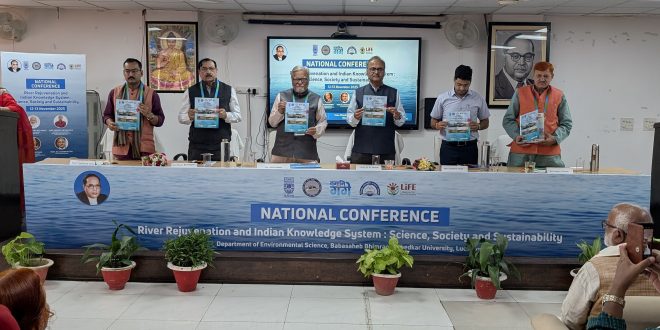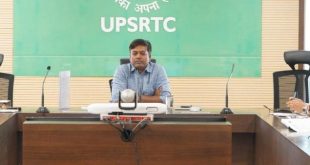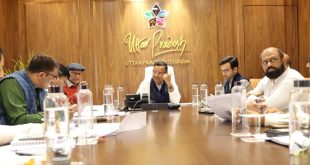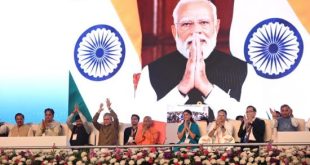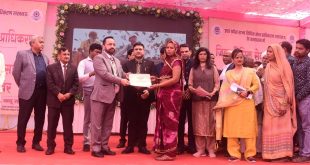Two-Day National Seminar on ‘River Rejuvenation and Indian Knowledge System: Science, Society, and Sustainability’ inaugurated at Babasaheb Bhimrao Ambedkar University, Lucknow
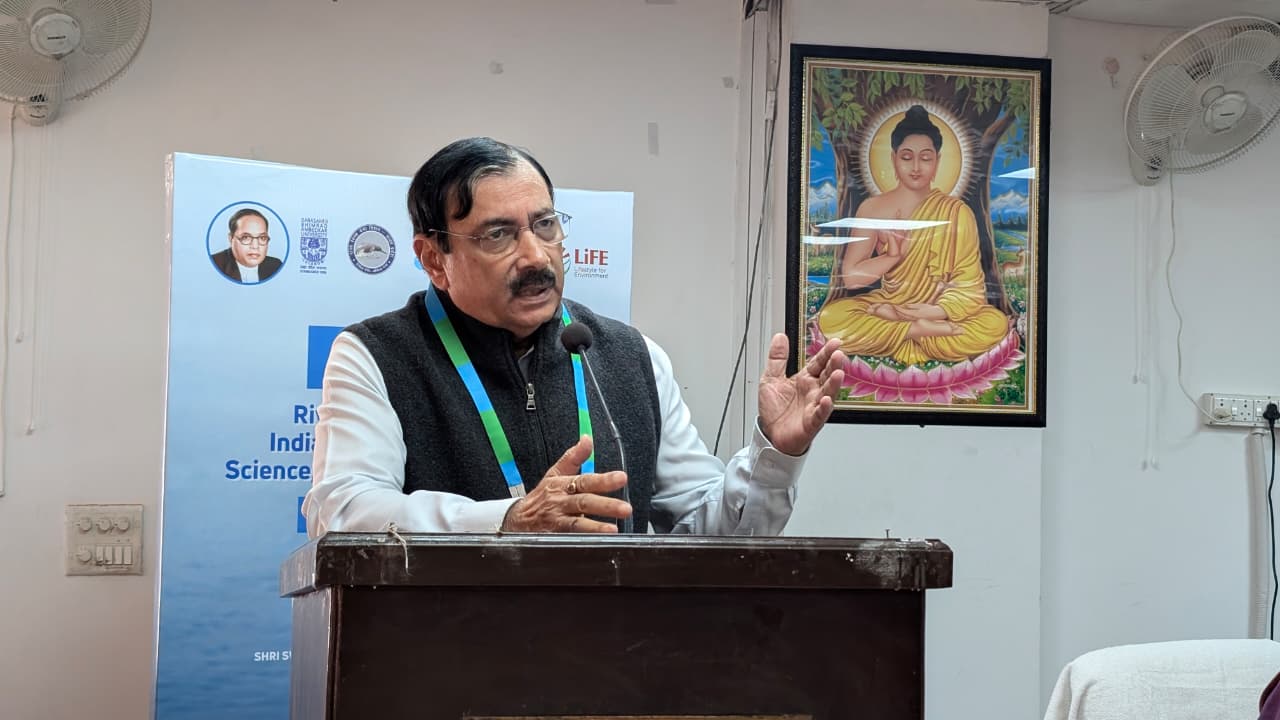
A two-day national seminar , organised by the Department of Environmental Science on the theme ‘River Rejuvenation and Indian Knowledge System: Science, Society, and Sustainability’ was inaugurated on November 12 at Babasaheb Bhimrao Ambedkar University (BBAU), Lucknow. The seminar was organised under the aegis of the Department of Environmental Science, BBAU, the State Mission for Clean Ganga, Uttar Pradesh, and Shiksha Sanskriti Utthan Nyas, New Delhi. The inaugural session was chaired by the Hon’ble Vice Chancellor, Prof. Raj Kumar Mittal. Dr. Atul Kothari, National Secretary, Shiksha Sanskriti Utthan Nyas, New Delhi was present as the chief guest. Other distinguished guests on the dais included Mr. Joginder Singh, Project Director, State Mission for Clean Ganga, Uttar Pradesh, Mr. Manu Bhatnagar from INTACH, Mr. Sanjay Swami, National Convener , Environmental Education, Shiksha Sanskriti Utthan Nyas and Prof. Venkatesh Dutta, Head, Department of Environmental Science, BBAU. The program began with the lighting of the ceremonial lamp and floral tributes to the portrait of Babasaheb Ambedkar. Following the rendition of the university Kulgeet, the organizing committee welcomed the guests and faculty members with floral bouquets. Prof. Venkatesh Dutta delivered the welcome address and outlined the objectives and framework of the seminar. The anchoring was done by Dr. Sufia Ahmad.
Addressing the gathering, Vice Chancellor Prof. Raj Kumar Mittal emphasized that river rejuvenation and water conservation are among the most urgent needs of the present time. He stated that natural resources available in the environment are limited, making their protection and judicious use essential. He contrasted Western thought, which focuses on exploiting resources for material gain, with Indian culture and knowledge traditions, which regard nature as a mother and teach respect and protection of it.
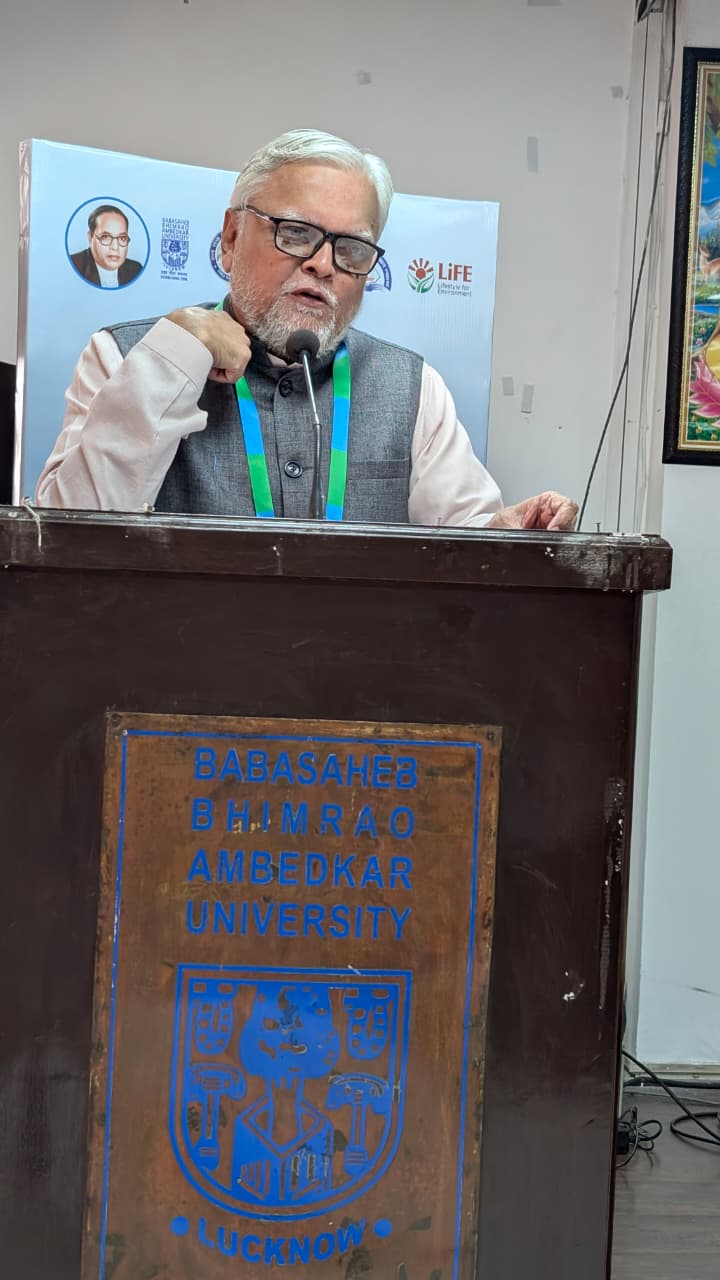 Prof. Mittal asserted that revival of rivers is possible only when government policies, public faith, and scientific efforts work together. He urged that society, scientific institutions, students, and policymakers must collectively take concrete steps toward this goal. He appealed to everyone to make water conservation an integral part of daily life, as it is the key to sustainable development and a secure future for coming generations.
Prof. Mittal asserted that revival of rivers is possible only when government policies, public faith, and scientific efforts work together. He urged that society, scientific institutions, students, and policymakers must collectively take concrete steps toward this goal. He appealed to everyone to make water conservation an integral part of daily life, as it is the key to sustainable development and a secure future for coming generations.
Dr. Atul Kothari, National Secretary, Shiksha Sanskriti Utthan Nyas, stated that environment should be the foundational theme of education, as it is the basis of life itself. He emphasized the need to integrate environmental education at all levels of schooling so that sensitivity toward nature develops from an early age. He referred to ancient Indian knowledge traditions that highlight the importance of the five elements (Panchabhutas) in maintaining environmental balance. He added that today’s problems—water scarcity, air pollution, and climate change are the outcomes of insensitive human actions. Hence, solutions cannot depend solely on government or administration; individual responsibility and initiative are equally essential. He also discussed the ‘Aadha Glass Pani Do’ (Serve Half a Glass of Water) campaign, calling it an inspiring initiative that promotes awareness about water conservation. He shared examples of various local efforts in environmental and water preservation and urged everyone to contribute actively toward protecting nature.
Mr. Joginder Singh, Project Director, State Mission for Clean Ganga, Uttar Pradesh, gave participants detailed insights into river morphology, flow patterns, and feeder water sources. He explained that a river’s natural form can only be preserved if balance in its flow and catchment area is maintained. Citing the examples of Revti and Nahal Rivers in Rampur District, Uttar Pradesh, he described how the combined efforts of the government and local administration have successfully rejuvenated these rivers through desilting, recharge of water sources, and plantation along riverbanks, which have improved both water level and flow. He added that multiple government initiatives, ranging from the national Namami Gange mission to various state-level river restoration programs are working toward river cleanliness, recharge, and biodiversity enhancement.
These ongoing efforts, supported by the Ministry of Jal Shakti, local bodies, and community participation, include beautification of riverbanks, sewage control, and rainwater harvesting. Mr. Singh highlighted that collaboration between government and society can indeed restore rivers to their natural, life-sustaining flow.
Mr. Manu Bhatnagar from INTACH remarked that while pollution is a major concern, the obstruction of natural river flow is an even greater threat. The natural flow, he said, is the lifeline of a river, and when it is disrupted, the river slowly loses its identity. He pointed out that the Ganga River Basin is India’s largest and supports millions of people. However, rejuvenation of large rivers is impossible without conserving smaller tributaries and streams, as they form the foundational network. He also emphasized that the Indian Constitution clearly defines environmental and river conservation as a fundamental duty of every citizen. He called for joint action by society, government, and experts to formulate strong, community-based policies ensuring clean and life-giving rivers for future generations.
Mr. Sanjay Swami, National Convener, Environmental Education, Shiksha Sanskriti Utthan Nyas, said that rivers have always been carriers of our culture and civilization. They have preserved biodiversity and natural heritage for centuries and serve as a link between society, environment, and culture. He noted that throughout history, most major conflicts have arisen from disputes over natural resources. Hence, he said, it is a moral duty of all to contribute to conserving natural sources. Mr. Swami added that seminars and discussions like these play a vital role in spreading awareness and initiating concrete actions for protecting rivers and the environment.
On this occasion, the Hon’ble Vice Chancellor and distinguished guests released the souvenir of the two-day national seminar. Two technical sessions were organized on the first day for the participants. The first technical session, chaired by Prof. P.K. Mishra,from IIT, BHU and former Vice Chancellor of AKTU was held on the theme ‘Frameworks for River Management and Rights of Rivers.’ During this session, Engineer-in-Chief Ashok Kumar Singh from the Irrigation Department, Government of Uttar Pradesh, presented on ‘Protecting Floodplains and River Rights.’ Dr. Amrisha Pandey from Symbiosis Law School discussed ,From Rights to Responsibilities: Reimagining River Personhood through Institutional Design in India’s Ganga Basin’ and Prof. Prabhat Kumar Singh from IIT (BHU) spoke on ‘Restoration of Rivers in Uttar Pradesh: Perspectives and Horizons.’ The second technical session, chaired by Mr. Sanjay Swami, focused on ‘Climate Change and River Resilience.’ Speakers included Dr. Ruchi Shri from Tilka Manjhi Bhagalpur University, who presented on ‘Gender and Environment: Frequent Floods and Dying Small Rivers in Bhagalpur (Bihar), Mr. Suresh Bhai from Himalaya Bhagirathi Ashram, Uttarkashi, Uttarakhand who discussed ‘Impact of Climate Change and Disasters on Himalayan Rivers’ and Dr. Sudeep Shukla from AI4Water Limited, United Kingdom, who spoke on ‘Approach for Modeling Climate Change Impacts on River Hydrology: A Case Study of the Teesta Basin, Sikkim.’ In addition, a panel discussion on ‘Relevance of IKS and Indigenous Knowledge on River Conservation’ was organized, followed by a meeting with River Mitras and members of Shiksha Sanskriti Utthan Nyas.
At the conclusion, the organizing committee presented mementos and shawls to the guests and expressed gratitude. Dr. N.K.S. More proposed the vote of thanks.
The event was attended by Deans of various schools, Heads of Departments, faculty members, non-teaching staff, officers from different districts, participants, and students.
 AnyTime News
AnyTime News 
